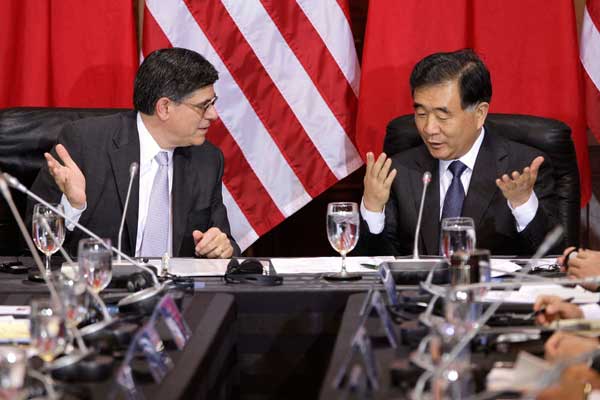Constructive mood at Sino-US talks
Economic giants focus on areas for positive action
It was supposed to be a chest-puffing summit between the two biggest economies in the world. Top leaders from China and the United States were slated to hold serious discussions on cybersecurity, climate change and outbound investments.
Instead, at the annual China-US Strategic and Economic Dialogue in Washington, both nations looked to immediately defuse any tension and nervousness at the outset of the two-day summit, with China taking the lead.
 |
|
China's Vice-Premier Wang Yang (right) and US Treasury Secretary Jacob Lew smile and shake hands at the start of the China-US Strategic and Economic Dialogue at the Treasury Department in Washington on Wednesday. Jonathan Ernst / reuters |
It turns out the summit won't be all about major disagreements.
In a speech on Wednesday, Chinese Vice-Premier Wang Yang likened the relationship between the two countries as a marriage.
"In China when we say there is a pair of new people, we mean a newlywed couple," said Wang, who was seated next to US Treasury Secretary Jack Lew.
Wang went on to describe how China and the US must cooperate and build trust like a married couple. Each must respect the other's right to speak. Divorce, he joked, is not an option.
"We cannot have a divorce the way Wendi and Rupert Murdoch just had," Wang said, referring to the high-profile divorce between News Corp chief executive and billionaire Rupert Murdoch and his Chinese-born wife of 14 years, Wendi Deng.
"For that, it would be too big a price to pay."
As the US and Chinese economies become increasingly interconnected, dialogue is better than confrontation, Wang said in his Wednesday speech.
He said the current talks should "turn the important agreement between the two presidents into tangible outcomes and add substance to their new model of a major country relationship".
US Vice-President Joe Biden, however, took on a more somber subject when he offered his condolences to the families of the Chinese victims who were killed in the Asiana Airlines plane crash in San Francisco.
But the pleasantries and jokes eventually gave way to talk of constructiveness and working through differences. Lew said the two sides have begun "constructive discussions on a broad range of strategic and economic matters".
"We are the world's two largest economies, and we both share the responsibility to work together cooperatively, even sometimes in the face of our differences," he said.
Lew said the fifth and latest round of talks presents "a new set of opportunities and challenges" with the US focusing on further strengthening its economy amid signs that the nation is growing economically and creating more jobs. China, he said, is focusing on reforms to sustain and broaden the growth of its middle class.
Sensitive issues
But Chinese analysts struck a more cautious tone. They said sensitive issues such as economic reform and cybersecurity may be too wieldy for the world's two biggest economies to handle in the two-day talks. They said progress is more likely in discussions over climate change and energy security.
"Climate change and energy security are low-hanging fruits that are most likely to yield concrete results," said Da Wei, director of the department of American studies under the China Institutes of Contemporary International Relations.
The two nations are also likely to make progress toward an investment treaty, according to Chinese analysts.
They surmise that each nation will discuss protecting their outbound investment ventures. China feels it is becoming more difficult to invest in the US market and vice versa, said Chen Fengying, director of the Institute of World Economic Studies under the China Institutes of Contemporary International Relations.
On Wednesday, a US congressional hearing discussed a $4.7 billion takeover bid by China's largest pork producer, Shuanghui International Holdings, of Smithfield Foods, the world's largest pork producer and processor. If the deal is approved, it will be seen in China as the US' more open attitude toward Chinese investment.
Besides discussions over climate change and a potential investments pact, the summit focused mostly on long-standing issues that have dominated each round of talks since the dialogue was launched in 2009, Sino-US observers said.
Xinhua and Reuters contributed to this story.
Special coverage:
The 5th China-US Strategic and Economic Dialogue





















